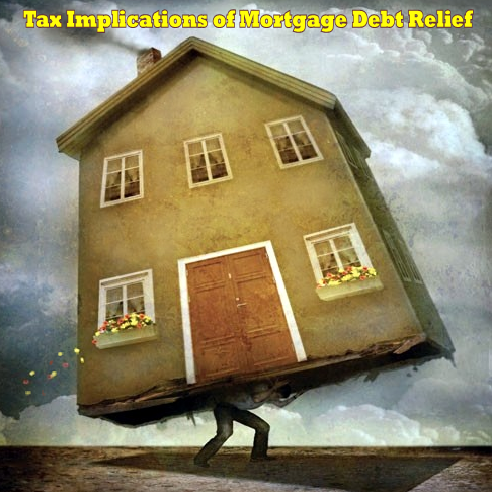
If a lender cancels or forgives money you owe, you usually have to pay tax on that amount. But when it comes to your home, an important exception to this rule may apply in 2013.
If the cancelled debt was a mortgage loan on your main home, you may be able to exclude the cancelled amount from your income. To qualify you must have used the loan to buy, build or substantially improve your main home.
The loan must also be secured by your main home.
If your lender cancelled part of your mortgage through a loan modification, or ‘workout,’ you may be able to exclude that amount from your income. You may also be able to exclude debt discharged as part of the Home Affordable Modification Program. The exclusion may also apply to the amount of debt cancelled in a foreclosure.
The Mortgage Debt Relief Act excludes from taxation discharges of up to $2 million of indebtedness that is secured by a principal residence and was incurred to acquire, build or make substantial improvements to the taxpayer’s principal residence.
While the determination of a taxpayer’s principal residence is to be based on consideration of “all the facts and circumstances,” it is generally the one in which the taxpayer lives most of the time. Therefore, vacation homes and second homes are generally excluded.
The limit is $1 million for a married person filing a separate return.
You may exclude under the above rules debt reduced through mortgage restructuring, as well as mortgage debt forgiven in a foreclosure.
To qualify, the debt must have been used to buy, build or substantially improve your principal residence. Home equity indebtedness is not covered by the new law unless it was used to make improvements to the home.
“Cash out” refinancing, popular during the recent real estate boom, in which the funds were not put back into the home but were instead used to pay off credit card debt, tuition, medical expenses, or make other expenditures, is not covered by the new law. Such debt is fully taxable income unless other exceptions apply, such as bankruptcy or insolvency.
To qualify, the debt must have been secured by the primary residence.
The exclusion may apply to amounts cancelled on a refinanced mortgage. This applies only if you used proceeds from the refinancing to buy, build or greatly improve your main home.
Proceeds of refinanced debt used for other purposes – for example, to pay off credit card debt – do not qualify for the exclusion.
If you qualify, claim the special exclusion by filling out Form 982, Reduction of Tax Attributes Due to Discharge of Indebtedness, and attach it to your federal income tax return for the tax year in which the qualified debt was forgiven.
The following debt forgiven do not qualify for this special tax relief provision and are discharge of indebtedness income:
In some cases, however, other tax relief provisions – including but not limited to insolvency, bankruptcy – may be applicable. For more on these other tax relief provisions please read Taxable Income From Cancellation of Debt Income and Exceptions and IRS Form 982.
If your debt is reduced or eliminated you normally will receive a year-end statement, Form 1099-C, Cancellation of Debt, from your lender. By law, this form must show the amount of debt forgiven and the fair market value of any property foreclosed.
You then must report any taxable income reported on this Form 1099-C on your tax return and as discussed above if you qualify for an exception you must report it on Form 982.
Be sure to examine the Form 1099-C carefully. Notify the lender immediately if any of the information shown is incorrect. You should pay particular attention to the amount of debt forgiven in Box 2 as well as the value listed for your home in Box 7.
Steven has been providing outstanding legal advice to me for seventeen years. He is THE authority on estate planning and financial planning. Steven is a compassionate and thorough attorney who thinks of every possible contingency. He easily explains complicated issues, and it has been my pleasure to recommend him to my friends.” November 11, 2008
Gwen Bland
1420 Walnut Street Suite 300
Philadelphia, PA 19102
Telephone: 215-735-2336
In order to help you more quickly, please
fill out the form and click “submit”.
A representative of the firm will call you shortly.
From their offices in Philadelphia, PA, the law firm of Steven J. Fromm & Associates, P.C. provides a full range of estate planning, probate and estate administration, tax, business and corporate legal services to clients throughout eastern Pennsylvania and the Delaware Valley, the Lehigh Valley Area, the Five-County Area, Bucks County, Delaware County, Montgomery County, Chester County, Philadelphia County, Berks County, Lehigh County, Lancaster County, York County, Harrisburg, Norristown, Doylestown, Media, West Chester, Allentown, Lancaster, and Reading.